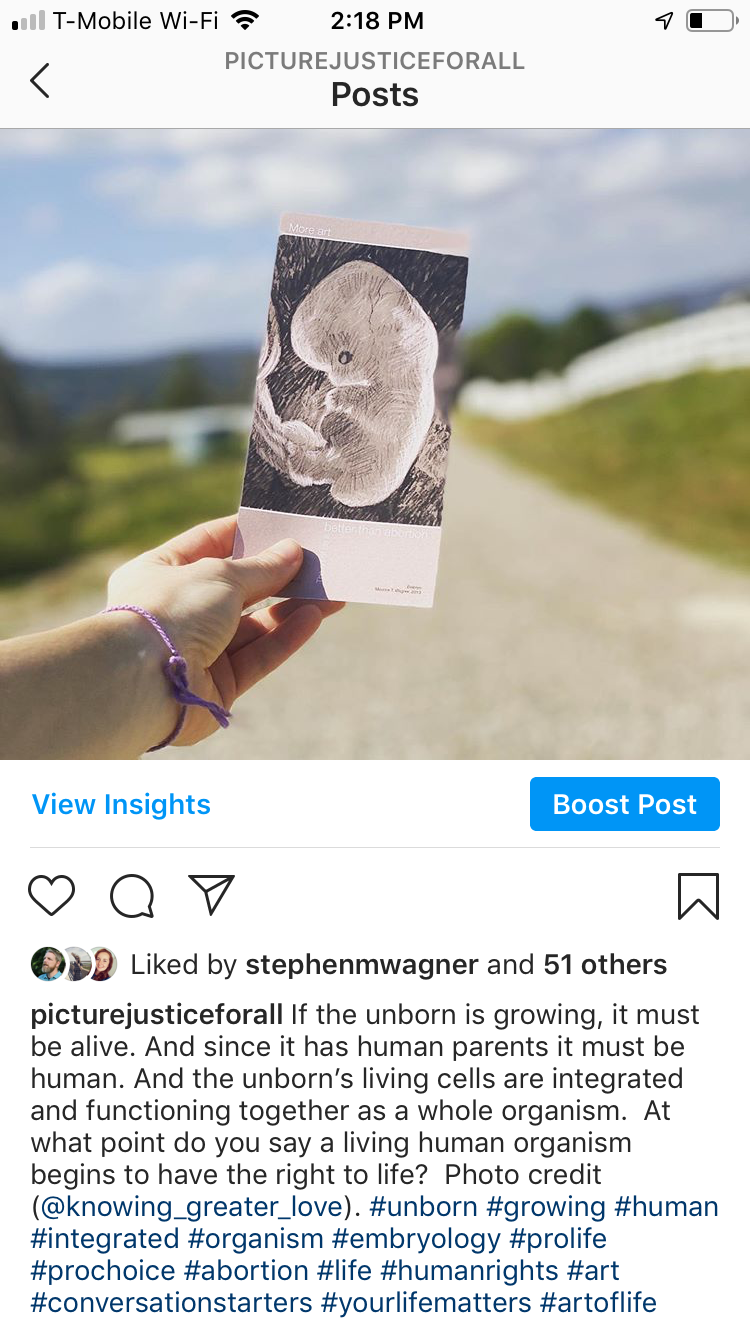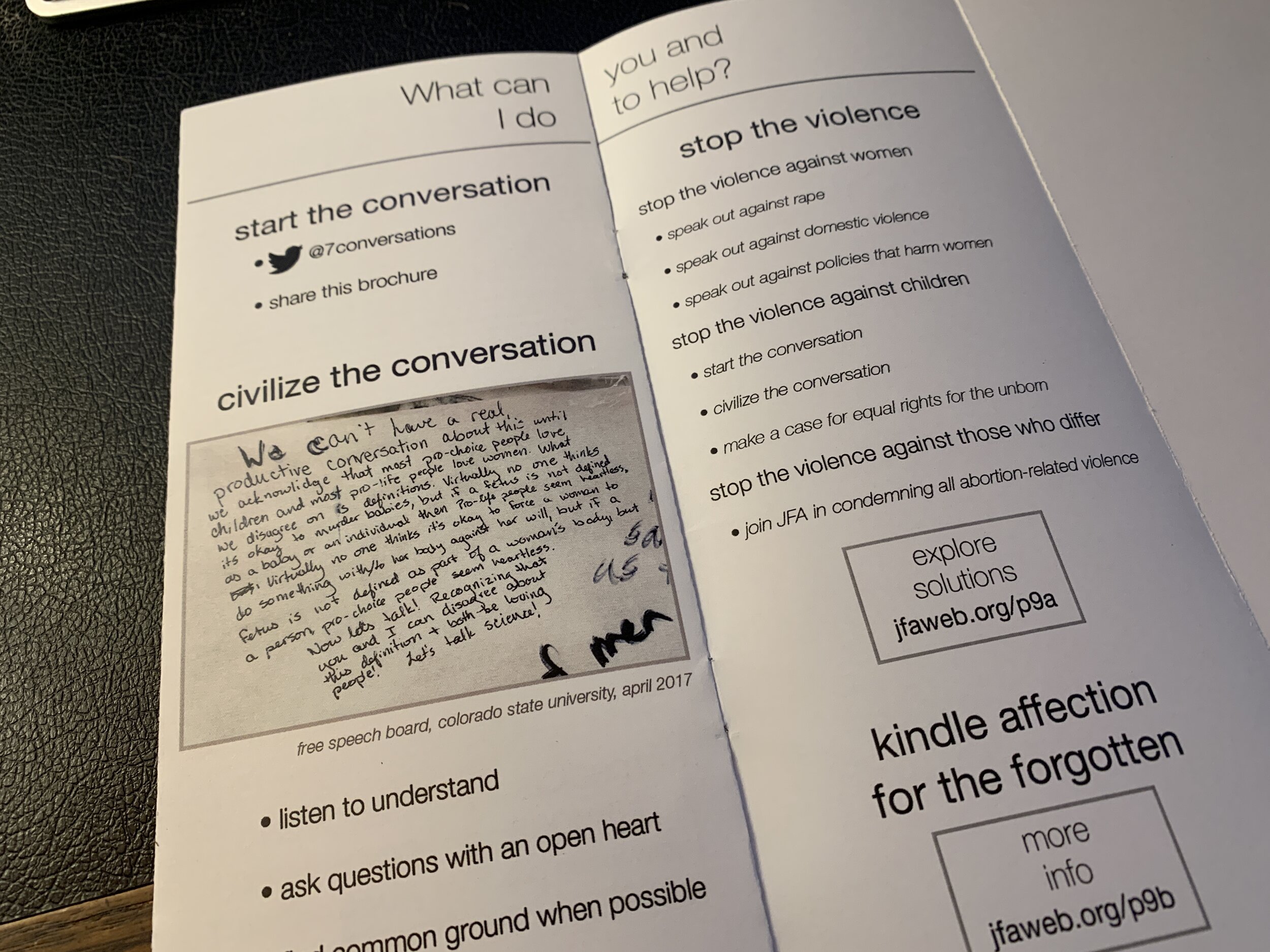Impact Report, July 2020
A Note From JFA’s Executive Director: Over the past few months, our team has been exploring the value of using social media for conversations about abortion. We’ve gathered regularly to share stories, to pray, and to evaluate different ideas for starting conversations. When Kaitlyn shared the story featured in this Impact Report, we were all spellbound. While we all long to return to face-to-face conversations at outreach, it appears that there are ways in which social media can open doors for conversation not likely to come about in person. - Steve Wagner, Executive Director
One of JFA’s Instagram posts, above, drew the comment below and led to a conversation. Follow JFA (@picturejusticeforall) to help us start more conversations.
From the very beginning, JFA has stretched my comfort zone. When COVID-19 forced us to cancel many of our spring outreach events and the leadership team announced that we were going to focus for the time being on using social media to have conversations about abortion, I knew that my comfort zone was going to be stretched yet again. Thankfully, our team has spent time praying together and encouraging each other as we have tackled this difficult project.
I have never used any form of social media. It intimidates me. Nevertheless, I started an Instagram account in the hope that I might be able to use it to start conversations with pro-choice people. I followed a couple of pro-life pages and began reading through the comments on their posts. I was intimidated by the many nasty comments from both pro-life and pro-choice people. I was determined to at least try to have a conversation, though, so I sent a direct message to every pro-choice person I saw regardless of whether their comments were nasty or not.
To my surprise, even the individuals who had left particularly offensive comments were generally open to dialogue when I engaged them in a respectful and friendly way. Within mere hours of starting an Instagram account, I was talking with a pro-choice girl. She shared with me her story and some of the difficult experiences that have shaped her views on this issue and other issues. We talked about the problem of pain, worldviews, and the gospel. Through this and other conversations, I was amazed and excited to discover that it is possible to have meaningful dialogue over Instagram.
I never would have thought that social media could become a platform for dialogue, much less that it might open doors for impact that in-person events never could.
I was having a conversation with another young woman on Instagram. She was very pro-choice. We talked about abortion for awhile and eventually began talking about faith. She shared her belief that the world is a simulation: We are characters in some more powerful being’s video game. We don’t have free will. Our every movement is determined by that other being.
I believe that different religious perspectives are worth discussing for their own sake, but I also believe that our religious perspective often becomes the foundation upon which all of our other beliefs are built. If someone believes that no one has free will, that we are just characters in a video game, it is likely that their pro-choice perspective flows from that belief and thus we must challenge that underlying belief system.
We talked for a while on Instagram direct message about her beliefs. After a while, she asked me what I believed, and I shared with her about my faith in Christ. But there are ways in which discussing these kinds of topics over direct message can be difficult, tedious, and frustrating. One has to type everything out, wait sometimes hours for a response only to be confused by the response, ask a question to clarify, then wait again.
Instagram has a video call option, so I asked her if she would be interested in doing a video call so that we could dive deeper into our discussion of our different worldviews. She said yes, and we picked a time that worked for both of us.
When I called, she answered and said that she had forgotten we were going to talk and that she and her friends were doing their nails. I said that we could definitely wait until a better time, but she insisted that we talk then. I expected a one-on-one conversation but what I got was a group conversation as her friends chimed in with their perspectives.
Background Photo by John Schnobrich on Unsplash
I asked more questions about their worldviews, and they asked questions about mine. I shared about my journey of coming to faith in Christ and some of the evidence for the resurrection of Jesus that I find to be convincing.
We talked for about an hour. When the conversation was over, I felt deeply disappointed. It wasn’t what I had hoped for. I had planned to have a one-on-one conversation. I had planned to dive seriously into our worldviews. Instead, I ended up in a group conversation that was too casual, lighthearted, and chaotic to allow us to focus in a serious way on the important topics I had come to discuss.
As much as I was disappointed by it, I believe that God had a plan. I intended to share the gospel with just one person and ended up sharing it with six different people all at once.
It also amazes me to think that a total stranger with a very different worldview than mine would invite me to “join” a party with her friends, share my perspective, and have a conversation. I didn’t think social media had any potential for impact let alone that it might allow me to accomplish something I couldn’t have done in person. I want to invite you to join us and try to have conversations on social media. You might be surprised by what God does through you.
Get Equipped to Create Conversations!
We’ve recently added new “7 Conversations in 7 Hours” interactive online workshops to our calendar. Get all of the details at www.jfaweb.org/7 and www.jfaweb.org/calendar.
Join Us for “Encouragement for Conversations”
We’ve just launched a brand-new program to support and encourage you as you seek to create conversations on social media and in everyday life. JFA’s experienced dialogue mentors host a video conference call every Thursday at 3 PM Central to allow you and other like-minded pro-life advocates to share stories, pray, and learn new ways to start conversations. Join us once, occasionally, or every week! Go to www.jfaweb.org/register and select “Encouragement for Conversations.”















